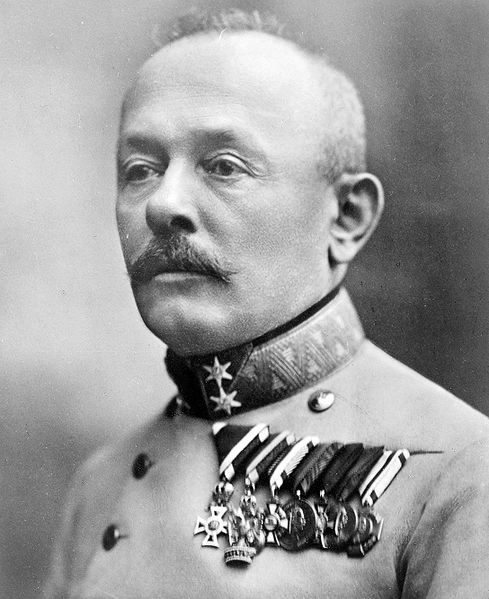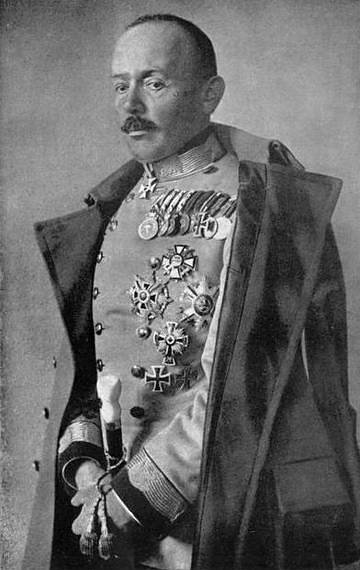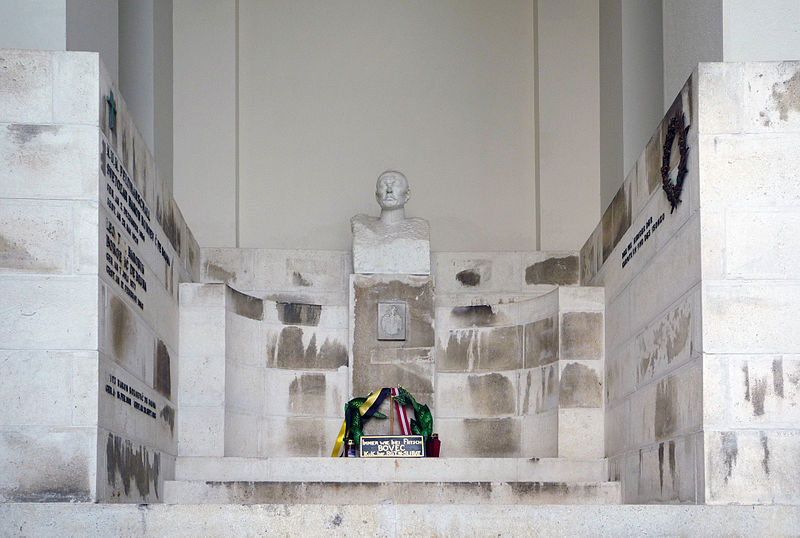<Back to Index>
- Inventor Ernst Werner von Siemens, 1816
- Writer Valery Yakovlevich Bryusov, 1873
- Field Marshal of the Austro-Hungarian Army Svetozar Boroëvić von Bojna, 1856
PAGE SPONSOR


Svetozar Boroević (or Borojević) von Bojna (December 13, 1856 – May 23, 1920) was an Austro - Hungarian field marshal who was described as one of the finest defensive strategists of the First World War. He came from Croatia but spent his entire life in the imperial military, becoming a nobleman as Baron von Bojna, and later rising to the rank of Field Marshal before the end of the First World War in 1918.
Boroević was born on 13 December 1856 in the village of Umetić, Military Frontier, Kingdom of Croatia, Austrian Empire (present day Croatia). The accounts of his ethnic and national origin differ because even though he was baptized in the local Orthodox Church, and his family was described as a "Serbian Grenzerfamily", he did not express a Serb nationality, rather he consistently stated that he was a "Croat" and is sometimes described as such, while most foreign sources simply refer to him as "Croatian".
Boroević joined cadet school at the age of ten. After finishing grade school he moved to Kamenica and later Graz where
he studied in military academies. In 1889, he married Leontina von
Rosner, a daughter of a late Austrian colonel, Friedrich Ritter von
Rosner. The couple had one son, Friedrich Borojević von Bojna, named
after his mother's father. The son died in 1918. He advanced quickly through the ranks (corporal in 1872, lieutenant in 1875) and became a commander in the Croatian Home Guard, an equivalent to the Hungarian Honvéd and
the Austrian Landwehr, defensive troops of parts of the Danube
Monarchy, in times of peace not belonging to the Imperial & Royal
Army. Before the First World War, he commanded the 42nd division of the Croatian Home Guard. In
1903 he was formally released from the Home Guard, already having been
assigned to the Imperial & Royal Army in 1898. During war, the
defensive troops were part of the Armed Forces commanded by the Supreme
Army Command (Armeeoberkommando) and could be used at the front. He distinguished himself in the Austro - Hungarian occupation of Bosnia and Herzegovina in
1878 and was promoted to the rank of Oberleutnant in 1880. Between 1887
and 1891 he underwent additional military training and worked as an
instructor after that, becoming a major in 1892. In 1897 he was
promoted to the rank of Oberst (colonel), and appointed chief of staff
of the Seventh Corps of the Imperial & Royal Army in June 1898,
where he remained until February 1904. In 1904 he was promoted Major
General (Generalmajor). In 1905 he was created a Hungarian nobleman
(since Croatia was one of the Lands of the Holy Hungarian Crown) with
the attribute von Bojna by
the Emperor & King. In 1908 the monarch made him Field Marshal
Lieutenant (Feldmarschallleutnant). He became the commander of the
Sixth Corps of the I & R Army in April 1912 and in 1913 General of
the Infantry. When the World War I started in 1914 he was in command of the Sixth Corps on the Eastern Front. In early September 1914 he became commander of the Third Army, and in early October he liberated Fort Przemysl, providing a temporary relief in the Siege of Przemyśl. His troops then pulled back to hold positions around Limanova, at the Dukla mountain pass, and elsewhere on the Carpathians, stopping the Russians from breaking out on the Danube. The Russian counter - offensive in February and March 1915 almost managed to push Boroević's Third Army back towards Hungary, but they managed to hold just enough for the German reinforcements to arrive and save the already endangered Budapest and the Pressburg bridgehead.
They then proceeded to join the general Austro - Hungarian / German
offensive (with the Austro - Hungarian Fourth Army under Joseph Ferdinand and the German Eleventh Army under Mackensen) that pushed back the Russians and would eventually retake Przemysl. However,
Boroević did not remain on the Eastern Front long enough to see
Przemysl liberated in June, because on May 25, 1915 he was sent to the
new Italian front, taking part of the Third Army with him and leaving
the rest to Army Group Mackensen. There Boroević became the Commander of the Fifth Army, with which he organized a defense against the Italians and broke countless offensives. Franz Conrad von Hötzendorf,
Chief of Staff (Generalstabschef), Supreme Army Command (Armeeoberkommando), recommended that they fall back and avoid trying
to defend the better part of today's Slovenia, claiming it was undefendable. However, Boroević persisted with thirty
of his detachments, maintaining that the Slovenes would stand their
ground when faced with the defense of their own country. This appealed
to emperor Francis Joseph and he was given command on the Soča (Isonzo) front. Boroević's troops prevented a total of eleven Italian attacks and he was hailed as the Knight of Isonzo in Austria - Hungary, while his soldiers adored him and called him Naš Sveto! ("Our
Sveto!"). For valor in combat he was promoted to the rank of
Generaloberst on May 1, 1916. On August 23, 1917 he rose to the
position of commander of the Southwestern Front, which was later renamed Army Group Boroević. In January 1918, he opposed Hungarian proposals to split Austria - Hungary's Army into separate Austrian and Hungarian units. He became Field Marshal on February 1, 1918, and was also awarded with numerous medals, including the highest order for Austro - Hungarian soldiers, the Military Order of Maria Theresia. The
front was maintained until November 1918, when the Hungarian troops
left the positions for returning to Hungary on the order of the new
Hungarian war minister (Hungary had canceled the real union with
Austria by October 31). After that Boroević regrouped at the Tagliamento river, then fell back to Velden,
where he sent a telegram to the Emperor offering to march on Vienna to
fight the anti - Habsburg revolution in the imperial capital. It is not
sure whether the Emperor has been handed out this message (Boroević
doubted it); the offer was refused on behalf of the Emperor. After the
Imperial & Royal Army had been demobilized by the Emperor on
November 6, Boroević was retired, by the I & R War Ministry in
liquidation, by December 1, 1918.
After the split-up of Austria - Hungary, Boroević decided to become a citizen of the newly created Kingdom of Serbs, Croats and Slovenes. He was not welcome, although he even had offered his services to the National Council of the State of Slovenes, Croats and Serbs. So he stayed in Carinthia,
now Austria's southernmost state; his personal belongings, which were
on transport in Slovenia, the former Austrian crown land of Carniola,
were confiscated there. Boroević could not understand the mean
treatment he had to experience, − the only field marshal the Southern
Slavs had ever produced, as he wrote in his memoirs. He died in a
hospital at Klagenfurt, the capital city of Carinthia. His body was transferred to Vienna where he was entombed at the Central Cemetery (Grave # 62 in the New Arcades
to the right of the Church of St. Charles Borromeo). The grave had been
paid for by the former emperor Charles,
who lived in Switzerland then. He could not take part in the funeral,
since he had been banished from Austria for his lifetime by the Habsburg Law since April 3, 1919.
